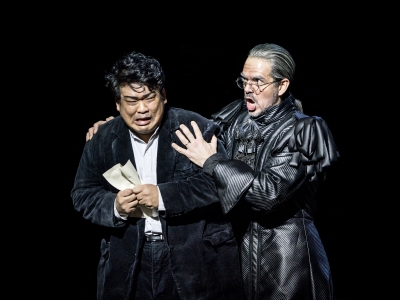

Les vêpres siciliennes Verdi
Archived: 2019/2020Overview
Based around true events which occurred in Sicily in 1282, Verdi’s grand opera features wonderful choruses and breath-taking arias, including the Bolero.
Hélène seeks justice for her murdered brother, as revenge and revolution set the scene for Les vêpres siciliennes. As Hélène’s sweetheart Henri, together with fellow rebel Procida, prepare to destroy his killer Montfort, a dark secret is revealed. Among the confusion and betrayal, the sound of wedding bells ring out, signalling the massacre that will destroy them all.
Based around true events which occurred in Sicily in 1282, Verdi’s grand opera features wonderful choruses and breath-taking arias, including the Bolero. In this striking new production, Director David Pountney and the creative team behind La forza del destino and Un ballo in maschera reunite to complete WNO’s Verdi Trilogy.
#WNOvepres
The GuardianIt is thanks to Rizzi in the pit that Verdi’s combination of power and finesse gives the ear much to savour, and there is theatricality and spectacle aplenty




Supported by
WNO Verdi Syndicate
The Kobler Trust
Patron of the Verdi Trilogy: His Excellency The Italian Ambassador

Good to know
Sung in French, with English surtitles (and Welsh in Cardiff and Llandudno)
Under 16s
£5 when accompanied by a full price adult tickets (subject to availability)
Ages 16 – 29
Tickets for £10 (subject to availability). Not available on top two or bottom price tickets
Facts
Danced by National Dance Company Wales
The final part of our Verdi Trilogy
Co-production with Theater Bonn
Synopsis
The Sicilian Vespers refer to massacres that took place in Palermo, 1282.
Sicily is under military occupation by the French. The resistance fighter Henri is in love with Duchess Hélène, whose brother was killed by French Governor Guy de Montfort. Hélène wants to reciprocate Henri's love once he avenges the death of her brother. Henri is invited to join de Montfort’s service, but when he spurns this offer, he is warned to keep away from Hélène.
Together with Jean de Procida, Henri and Hélène want to overthrow the French in Sicily. Henri is arrested for declining an invitation to a ball hosted by de Montfort. Procida deliberately inflames anti-French feeling by encouraging French soldiers to kidnap peasant girls.
Henri learns that de Montfort is in truth his father. During a masked ball Henri prevents an assassination of de Montfort planned by Procida and Hélène. They are dragged off to prison and Henri is branded a traitor to the resistance.
Learning why Henri saved de Montfort, Hélène forgives Henri. On condition that Henri acknowledges him as his father, de Montfort agrees to pardon the conspirators. To prevent further bloodshed, de Montfort arranges the marriage between his son Henri and Hélène as a sign of reconciliation.
As the approaching marriage is celebrated, Hélène is appalled to learn from Procida that the wedding bells will serve as a signal for a massacre of the French. She desperately tries to prevent the marriage, but the bells – the Sicilian Vespers – ring out and the Sicilian resistance fighters attack the unsuspecting French.



